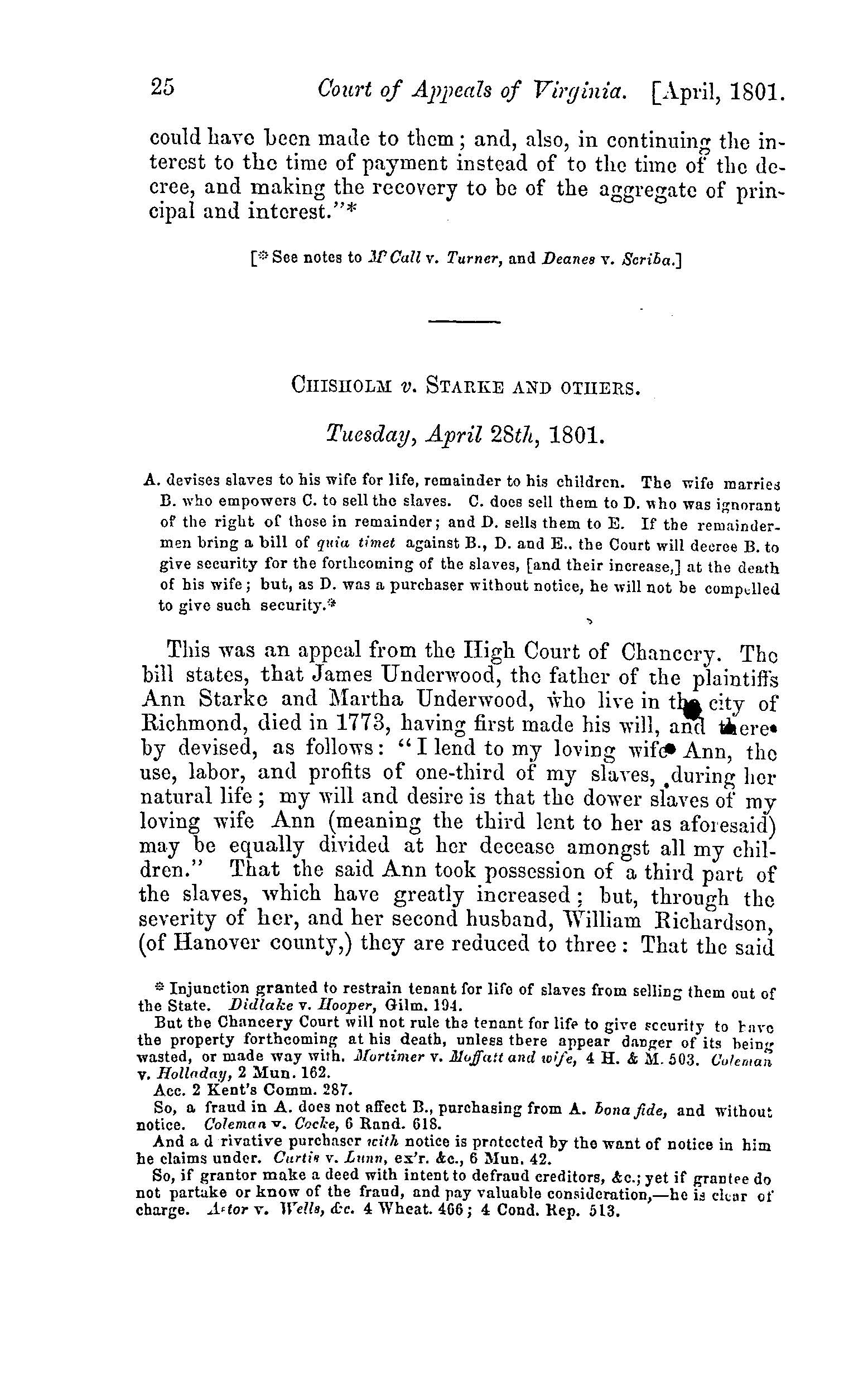Difference between revisions of "Chisholm v. Starke"
m |
m |
||
| (9 intermediate revisions by 5 users not shown) | |||
| Line 1: | Line 1: | ||
{{DISPLAYTITLE:''Chisholm v. Starke''}} | {{DISPLAYTITLE:''Chisholm v. Starke''}} | ||
| − | [[File: | + | [[File:CallChisholmvStarke1854v3p25.jpg|link={{filepath:CallsReports1854V3ChisholmvStarke.pdf}}|thumb|right|300px|First page of the opinion [[Media:CallsReports1854V3ChisholmvStarke.pdf |''Chisholm v. Starke'']], in [https://wm.primo.exlibrisgroup.com/permalink/01COWM_INST/g9pr7p/alma991006014269703196 ''Reports of Cases Argued and Adjudged in the Court of Appeals of Virginia''], by Daniel Call. 3rd ed., ed. Lucian Minor. Richmond: A. Morris, 1854.]] |
| − | + | ||
| − | [[Media:CallsReports1854V3ChisholmvStarke.pdf|''Chisholm v. Starke'']], Call | + | [[Media:CallsReports1854V3ChisholmvStarke.pdf|''Chisholm v. Starke'']], 7 Va. (3 Call) 25 (1801),<ref>Daniel Call, ''[[Reports of Cases Argued and Adjudged in the Court of Appeals of Virginia]],'' 3rd ed., ed. Lucian Minor (Richmond: A. Minor, 1854), 3:25.</ref> was a case where the court determined whether a stepfather was entitled to his stepchildren’s remainder in slaves devised by their father. |
==Background== | ==Background== | ||
| − | James Underwood's children sued their | + | James Underwood's children sued their stepfather and several other defendants concerning slaves in which they had a remainder in. According to Underwood’s will, a third of his slaves were to be left to his wife, Ann Underwood, for the duration of her life and then divided among their children. However, after remarriage to Mr. William Richardson, Ann’s slaves were sold by Richardson to several other defendants, one of which received the slaves without notice of the children's property rights. |
| + | |||
===The Court's Decision=== | ===The Court's Decision=== | ||
Chancellor Wythe decreed that Richardson should give a £500 penalty to the children for selling their remainder as well as a £500 penalty for the loss of the slave and her children. The Court of Appeals affirmed. | Chancellor Wythe decreed that Richardson should give a £500 penalty to the children for selling their remainder as well as a £500 penalty for the loss of the slave and her children. The Court of Appeals affirmed. | ||
| + | |||
==See also== | ==See also== | ||
*[[Wythe's Judicial Career]] | *[[Wythe's Judicial Career]] | ||
| Line 14: | Line 16: | ||
<references/> | <references/> | ||
| − | + | __NOTOC__ | |
| − | |||
[[Category: Cases]] | [[Category: Cases]] | ||
| + | [[Category: Inheritance]] | ||
| + | [[Category: Slavery]] | ||
Latest revision as of 12:25, 7 September 2023

Chisholm v. Starke, 7 Va. (3 Call) 25 (1801),[1] was a case where the court determined whether a stepfather was entitled to his stepchildren’s remainder in slaves devised by their father.
Background
James Underwood's children sued their stepfather and several other defendants concerning slaves in which they had a remainder in. According to Underwood’s will, a third of his slaves were to be left to his wife, Ann Underwood, for the duration of her life and then divided among their children. However, after remarriage to Mr. William Richardson, Ann’s slaves were sold by Richardson to several other defendants, one of which received the slaves without notice of the children's property rights.
The Court's Decision
Chancellor Wythe decreed that Richardson should give a £500 penalty to the children for selling their remainder as well as a £500 penalty for the loss of the slave and her children. The Court of Appeals affirmed.
See also
References
- ↑ Daniel Call, Reports of Cases Argued and Adjudged in the Court of Appeals of Virginia, 3rd ed., ed. Lucian Minor (Richmond: A. Minor, 1854), 3:25.